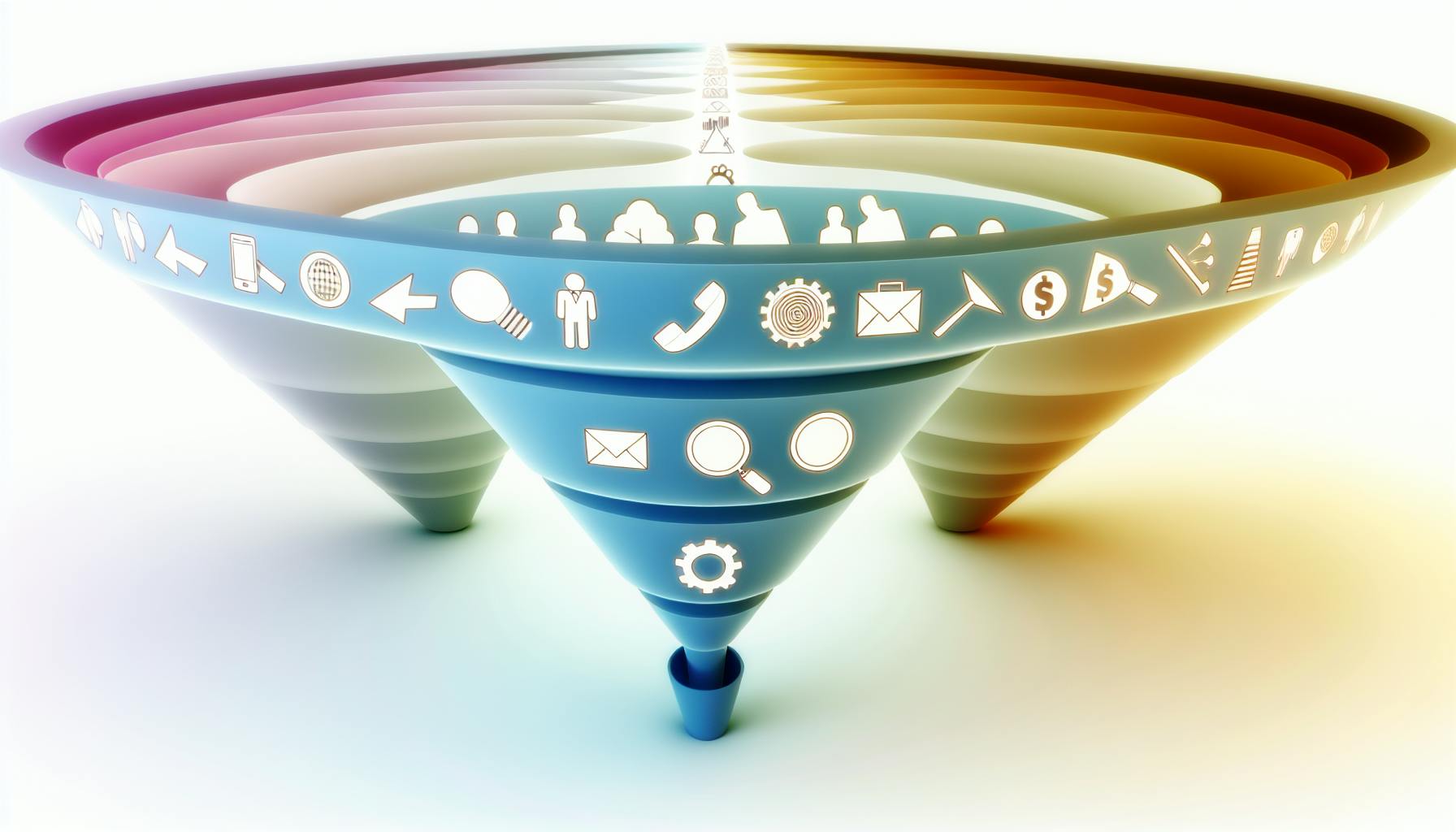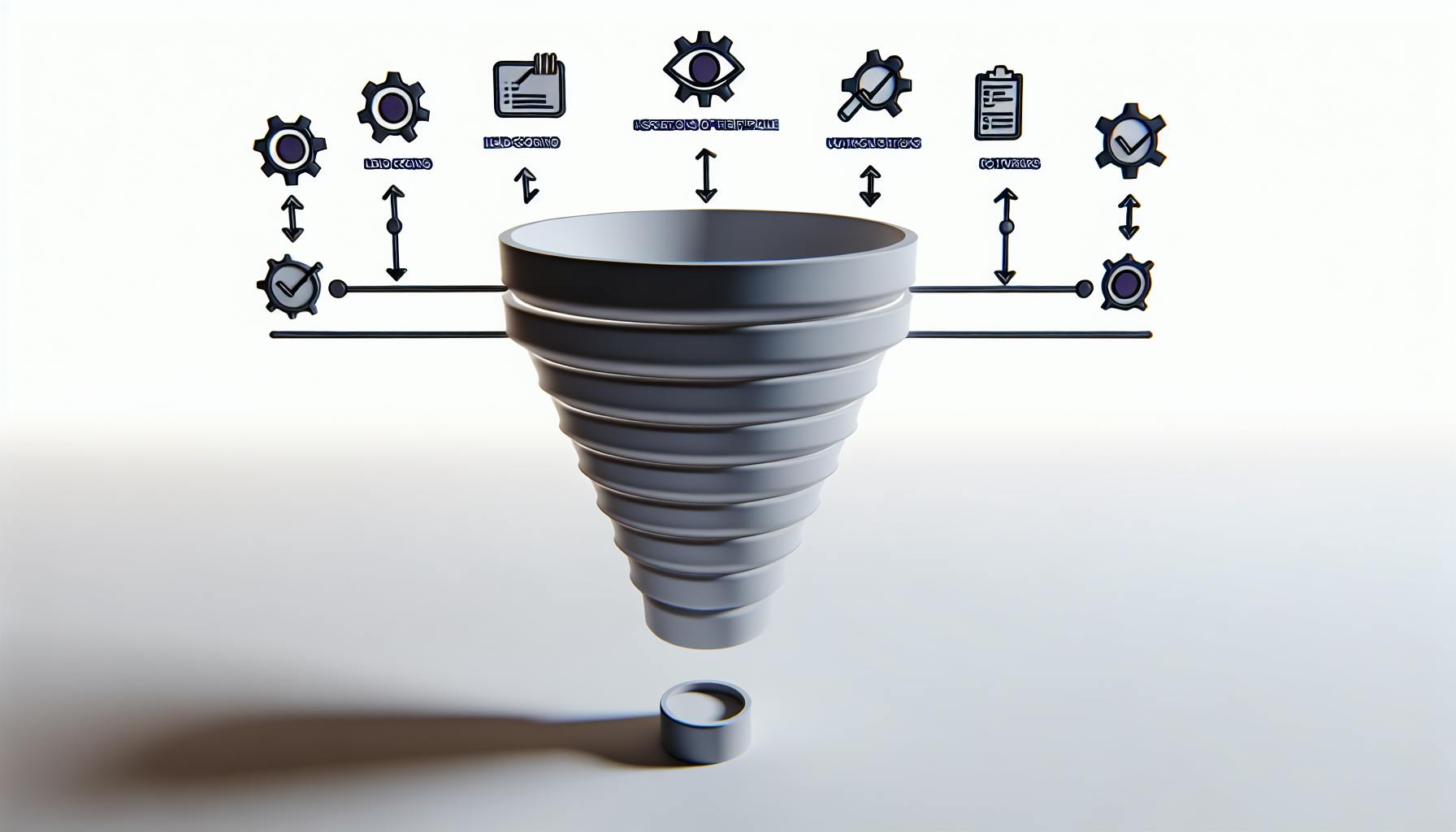AI is changing how businesses find and convert leads. Here's why it matters and what you can expect:
- AI solves common problems: Manual lead generation is slow and prone to errors, with 79% of leads failing to convert due to poor nurturing. AI fixes this through automation, better targeting, and personalized outreach.
- Key benefits: AI boosts productivity, improves lead quality, and increases revenue. For example, companies using AI see 133% higher revenue and up to 199% better email click-through rates.
- Smart tools: AI platforms like Apollo and chatbots help with lead targeting, scoring, and personalized communication, saving time and improving results.
- Improved campaigns: AI automates repetitive tasks, refines strategies in real-time, and integrates seamlessly with CRM systems.
AI doesn’t replace human effort - it enhances it, allowing teams to focus on building real connections while improving efficiency.
| Traditional Methods | AI-Powered Methods |
|---|---|
| Manual lead scoring | Dynamic, real-time algorithms |
| Generic email campaigns | Personalized, data-driven outreach |
| Time-intensive processes | Automated, faster workflows |
Start using AI responsibly by protecting data, maintaining the human touch, and refining your strategy for better results.
Using ChatGPT to Generate 1000s of Leads in Any Niche
Finding Leads with AI
AI tools are transforming how businesses find and qualify leads, making the process faster and more precise. These solutions go beyond just finding leads - they add depth and context, improving the entire sales pipeline.
Smart Lead Targeting
AI simplifies the process of identifying the right prospects. For example, Apollo's B2B database boasts over 200 million contacts and 35 million companies. It uses AI to help sales teams zero in on the best-fit customers, offering over 65 filtering options for highly specific targeting.
"Apollo enriches everything we have: contacts, leads, accounts. We don't really have to touch it, it just works." - Mark Turner, VP of Revenue Operations at Built In
This technology delivers results. Customer.io saw a 70% jump in sales-qualified leads after adopting Apollo's AI targeting. Similarly, Cyera's sales team booked 75% more meetings using AI-driven prospecting. These tools streamline targeting, making sales efforts more productive.
Lead Scoring with AI
AI takes lead scoring to the next level by continuously learning and adapting to buyer behavior, far outpacing traditional methods:
| Aspect | Traditional Scoring | AI-Powered Scoring |
|---|---|---|
| Method | Static rules | Dynamic algorithms |
| Data Analysis | Limited manual input | Comprehensive automation |
| Adaptation | Fixed criteria | Self-learning system |
| Accuracy | Variable | Higher precision |
| Speed | Time-intensive | Real-time updates |
A staggering 98% of sales teams using AI report better lead prioritization. These systems analyze everything from website visits and email interactions to social media activity and purchase history. The result? Smarter outreach and better conversion rates.
Adding Detail to Lead Profiles
AI also enhances lead profiles by gathering detailed insights. Apollo's AI assistant, for example, pulls information from professional posts and web content to create rich, personalized profiles. This allows sales teams to craft tailored approaches.
"I use Apollo for everything - prospecting, messaging, even the dialer. It's where I spend most of my day, and it has made my workflow so much more efficient." - Diego Cobian, Account Executive at Arbolus
Census experienced impressive results by switching to AI-powered tools, increasing their contact data fourfold while cutting platform costs by 64%. These enriched profiles make personalized outreach more effective, setting the stage for success in future interactions.
Making Outreach Personal at Scale
AI tools help sales teams create personalized outreach efforts on a larger scale, using data-driven insights to build stronger connections.
Smart Email Campaigns
With detailed lead profiles, AI takes email outreach to the next level. These platforms analyze customer data to create targeted messages, leading to 26% higher open rates, 29% better response rates, and a 29% boost in revenue growth.
| Feature | Traditional Email | AI-Powered Email |
|---|---|---|
| Data Analysis | Basic segmentation | Real-time behavioral analysis |
| Customization | Name insertion only | Detailed profile customization |
| Content Adjustment | Static templates | Dynamic content adjustment |
| Testing | Manual A/B tests | Continuous optimization |
| Timing | Fixed schedules | Smart delivery timing |
Using Chatbots to Screen Leads
AI chatbots go beyond simple automation. They qualify leads through natural conversations, schedule meetings, answer FAQs, and gather vital data. Research shows that 72% of consumers are more likely to interact with chatbots when the messaging feels personalized.
Custom Messages for Each Lead
AI transforms cold outreach into meaningful interactions by analyzing digital footprints. This approach can triple the chances of securing meetings. Instead of generic messaging, tailor outreach to address specific business challenges, such as managing rapid growth rather than broadly discussing hiring trends.
Adding a personal touch pays off. For example, personalized calls to action convert 202% better, while custom images and GIFs can increase response rates by 76%. This approach allows you to scale outreach efforts without losing the human element.
sbb-itb-8aac02d
Managing Sales Campaigns with AI
AI is revolutionizing sales campaigns by turning time-consuming, manual processes into streamlined, data-driven strategies.
Automating Daily Tasks
Repetitive tasks can drain valuable time, but AI steps in to handle them, allowing teams to focus on building stronger customer relationships. For example, 64% of e-commerce marketers report higher sales thanks to automation tools like Dripify and Pipedrive. These tools cut hours of manual work into just minutes.
"Upside of using Dripify is that you save a huge amount of time, that would otherwise be manual actions, reducing 2-3 hours of work a day to just a few minutes once a week." - Philip Bacon, Marketing Director Periti
| Task Type | AI Automation Benefits | Impact |
|---|---|---|
| Lead Distribution | Automatic routing based on criteria | Faster lead assignment |
| Follow-ups | Scheduled drip campaigns | Consistent communication |
| Data Collection | Automated gathering and organization | Centralized, accurate data |
| Feedback | Automated satisfaction surveys | Ongoing customer insights |
By taking over these tasks, AI ensures campaigns are not only efficient but also adaptable to changing needs.
Testing What Works Best
AI-powered tools bring real-time analytics to the table, making campaign testing and adjustments quicker and more precise. A standout example is CreativeRace, a UK-based company that saw a 600% jump in year-over-year client acquisition and a 42% faster lead-to-opportunity conversion using AI-driven testing.
"Overall, Pipedrive has improved our targeting and accuracy in data. Using the customized fields has helped us to create relevant lists to target, as well as maintaining the most up-to-date data that feeds through to our dashboards and reporting." - Oliver Lee, Sales Director, CreativeRace
AI tools continuously analyze performance, refining targeting, timing, and budget allocation based on live data. This kind of real-time optimization works seamlessly with CRM systems, enhancing campaign outcomes.
Working with Your CRM
When paired with CRM systems, AI creates a robust foundation for successful sales strategies. With the CRM market valued at $58.04 billion in 2022 and growing at 13.9% annually, more businesses are tapping into the potential of AI-CRM integration.
Take CMY Cubes, for instance. They combined a GPT AI model tailored to their brand with AI analytics to assess marketing performance. This helped them pinpoint their most effective social media channels and allocate their marketing budget wisely - all without needing a dedicated data team.
To make the most of AI-CRM systems, businesses should prioritize clean data, customize AI tools to their needs, train teams thoroughly, monitor performance, and uphold data security.
Blending AI automation with CRM systems creates a well-rounded sales environment that improves efficiency while keeping customer interactions personal. In fact, 46% of business owners now use AI in customer relationship management, emphasizing its growing importance in sales campaign management.
Using AI Responsibly in Sales
Protecting Lead Data
Safeguarding data isn't just about following the law - it's about earning trust. With GDPR fines reaching up to 4% of global revenue and CCPA penalties of $7,500 per violation, businesses can’t afford to overlook data protection when using AI for lead generation.
"It's about collecting and using data legally. Disrespecting client privacy can lead to violations."
– DataGuard Insights
Here’s how businesses can protect lead data effectively:
| Data Protection Element | Implementation Strategy | Business Impact |
|---|---|---|
| Consent Management | Double opt-in process | Proof of permission |
| Data Minimization | Collect only necessary info | Reduced liability |
| Security Measures | Encryption and secure servers | Protected sensitive data |
| Audit Trail | Document all data activities | Compliance verification |
Keeping the Human Touch
Even with AI making sales processes more efficient, 83% of U.S. customers still prefer some level of human interaction. Companies that excel at personalizing their outreach see 40% higher revenue from these efforts.
"Real personalization isn't just plugging someone's name into a template. It's understanding their business, their challenges, and their goals."
– Brandon Bornancin
AI works best when it supports - not replaces - human effort. Let AI handle tasks like data collection and initial outreach, freeing up sales teams for meaningful, personalized conversations. This approach can boost productivity by 50% while keeping relationships authentic. To keep this balance, regularly adjust your AI tools to ensure they complement, rather than overshadow, human connections.
Improving Your AI Strategy
To get the most out of AI, you’ll need to monitor its performance, reduce bias, and maintain oversight. While AI excels at targeting leads and streamlining outreach, refining your strategy ensures the entire sales process remains effective and ethical.
"When AI is set for a task that's too broad, there is no way for it to be unbiased because a lot of what is ethical is contextually relevant."
– Mikey Fischer
Steps to improve your AI strategy include:
- Monitor Performance: Use key metrics to track outcomes.
- Address Bias: Test algorithms with diverse data sets.
- Maintain Oversight: Keep humans involved in reviewing AI-driven decisions.
Transparency is critical. As DataGuard Insights explains, "Transparency is the name of the game, and as studies have shown, the more transparent a brand is, the likelier people are to trust and stick by it."
Prioritize collecting data directly from your customers and work with AI providers that share your ethical standards. Regular audits not only ensure compliance but also improve your AI’s effectiveness. Above all, make sure your AI strategy reflects your company’s values and meets your customers’ expectations.
Conclusion
Main Points
AI and automation are transforming how businesses handle lead generation and conversion. Recent studies reveal that AI-driven lead generation can improve lead qualification rates by up to 50%. Here's how AI is making an impact across different areas:
| Area | Impact | Example Results |
|---|---|---|
| Lead Quality | 50% improvement in qualification rates | Technology startups report a 25% boost in conversions |
| Sales Productivity | 30% increase | Marketing agencies using Einstein prioritize leads more effectively |
| Customer Engagement | 40% rise in qualified leads | Retailers using AI chatbots after hours see better engagement |
| Client Acquisition | 20% growth | Financial firms leveraging Sales Navigator gain more clients |
These examples highlight the potential of AI to refine your lead generation process.
Getting Started
Ready to integrate AI into your strategy? Here's how to begin:
1. Evaluate Your Current Workflow
Conduct a thorough review of your lead generation and sales processes. Research indicates that detailed audits can increase conversions by up to 28%.
2. Select the Right Tools
Sales teams often spend 64% of their time on tasks unrelated to selling. Automate repetitive tasks like:
- Data entry and enrichment
- Lead scoring and qualification
- Initial customer interactions
- Follow-up sequences
3. Focus on Integration and Training
AI-powered CRMs could add over $1 trillion to global business revenues by 2030. To get the most out of these tools, implement:
- Regular data cleaning practices
- Comprehensive team training
- Systems for tracking performance
- Ongoing optimization routines
Good data is critical - 45% of sales reps struggle with incomplete or inaccurate data. Prioritize data quality and schedule frequent system audits to ensure your AI tools deliver the best results.


